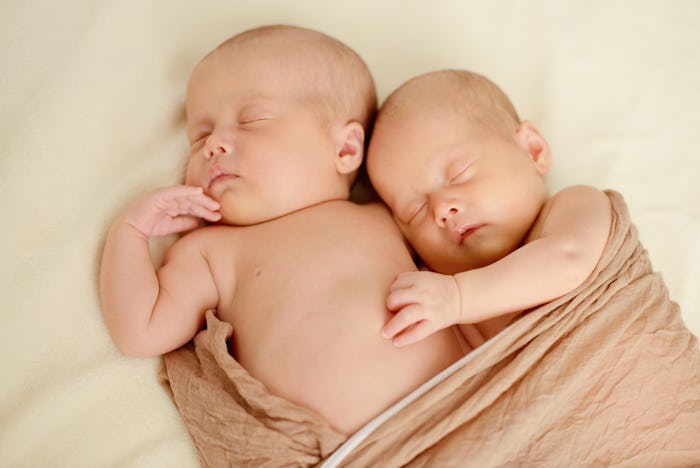Life

Can You Co-Sleep With Twins?
For parents of multiples, it can feel like sleep is pretty much non existent. If one isn't up, the other is. If one doesn't need a diaper change, the other does. Taking care of multiples is relentless parenting around the exhausting clock. Nailing a sleep routine is paramount for parents of multiples. Maybe you always wanted to give co-sleeping a whirl or maybe you're trying out different sleeping routines to see what works best for you and your babies. However you reached the co-sleeping conundrum, parents of multiples may be wondering can you co-sleep with twins?
The short answer is yes, but be aware there are a few caveats. Before delving into the safety surrounding co-sleeping, it's important to remember that, according to Kids Health, co-sleeping means that parents and their babies are in close proximity to each other. Co-sleeping can be in the form of placing a bassinet or crib, or bassinets/cribs (plural) next to a sleeping parent, but never in the same bed as a sleeping parent. Co-sleeping simply means parent and child are in the same room and assumed to be only a short distance away. Co-sleeping is not synonymous with bed-sharing, which, according to the same website, is when babies and parents all sleep in the same bed.
Dr. William Sears, prolific advocate of attachment parenting, is quoted in Parenting as saying co-sleeping with twins can be done, but "a king-size bed is a must." (It's worth noting that Sears is clearly referring to co-sleeping as the more controversial and debated bed-sharing sleep arrangement.) As such, Sears recommended that single parents considering co-sleeping, or specifically bed-sharing, with their twins to sleep in the middle of both babies. If you have a partner, he suggested the partner sleep in a different room sometimes so the one doing the bed-sharing and presumably the bulk of night feedings has more room to spread out and get rest. Sears claimed that breastfeeding moms of multiples like the bed-sharing arrangement as it allows them to nurse one baby and quickly roll over to nurse the other baby before they're both fully awake His recommendations however, are at the center of much debate among doctors and researchers in the medical field.
The American Academy of Pediatrics (AAP) has set guidelines for safe sleeping arrangements with babies, and bed-sharing is not recommended because of the risk of Sudden Infant Death Syndrome (SIDS). The site noted that the safest place for an infant to sleep is on a separate sleep surface designed for babies and close to a parent's bed. Parents who bring their babies into bed to comfort or feed them are urged to return them to their own cribs or bassinets when finished. The site stressed that babies should be placed on their backs, away from a parent that smokes tobacco, uses illicit drugs, or drinks alcohol, and that no blankets or bumpers should be used.
The choice is ultimately yours of whether you co-sleep, bed-share or neither with your twins. Knowing the perceived or theorized benefits and risks to both will ultimately help you make the best decision for your family. Being well-informed about your options and possibly trying them out will bring clarity and hopefully sleep to your life very soon.